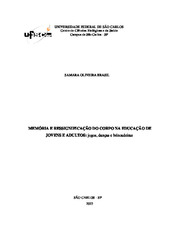Memória e ressignificação do corpo na educação de jovens e adultos: jogos, danças e brincadeiras
Resumen
Physical Education in youth and adult education is still a marginalized curricular component. Bearing in mind the respective proportions, it confuses itself with the challenges of EJA - youth and adult education, when it comes to lack of public policies which guarantee viability and continuity of Physical Education in this teaching method. Considering that, the present study aims to investigate how the body culture can contribute to the feeling of belonging and appreciation of EJA, as well as to promote the construction of citizenship and social inclusion. The research methodology of qualitative nature used action research as means of data collection. The field diary has been used as an important instrument to register information, organize and analyze data. As a secondary resource, audio recordings from cell phones have been used as well, for better understanding of speech. Twenty-two students from EJA have participated in this research, from the basic literacy stage in a municipal school in São Paulo. The didactic unit embraced games and dance, and was applied for two months, totalizing fourteen classes. After registering, organizing and analyzing data, the set of information indicated themes related to memories, childhood games, socioeconomic difficulties, thus constituting two categories: "Memories as a collective body" and "What is the body's place at EJA?" As a theoretical reference, it was searched for debates of authors who are aligned to cultural studies and critical pedagogy, in the perspective of bringing the investigative look towards body practices that strengthen the experiences and collective memories to potentialize an elaboration of ways to be and act in the world. Therefore, the question: what is the importance of the body at school? What is the importance of the working student body in building knowledge? And what is the contribution of Physical Education to these students? It was determined that the shared life stories, such as the experience of body practices through games and dances, contributed to the appreciation of ludic knowledge, playing freely and expressing creativity, marked in memory as an unique body, diverse and reflective. It revealed the desire of continuing the classes, the feeling of belonging and necessity to broaden the reflections on the emerging themes. With the results obtained, it is expected that Physical Education at EJA can have its space enlarged beyond documents and discussions, with public policies that guarantee the student's rights to participate effectively in classes, respecting the public's particularities and needs.
Colecciones
El ítem tiene asociados los siguientes ficheros de licencia:

